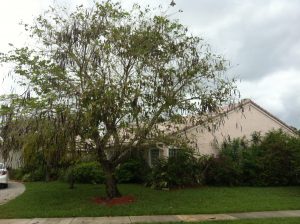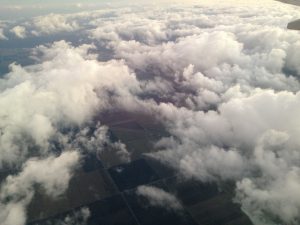
11 Sep Gale-force will: The hurricane and elders
 It’s so easy to say what you think you would do, or should do, in an emergency, and quite another when you’re actually in it, factoring in real live humans who have their own hurricane-force needs and wills and are having their own particular reaction to the news that they may or may not be about to be blown to smithereens.
It’s so easy to say what you think you would do, or should do, in an emergency, and quite another when you’re actually in it, factoring in real live humans who have their own hurricane-force needs and wills and are having their own particular reaction to the news that they may or may not be about to be blown to smithereens.
This includes, in particular, older people.
Like everyone with loved ones in the path of Hurricane Irma, I’ve just spent a sleepless, nail-biting week of maniacal, smartphone-thumbing in search of reliable news and information. I’ve also been fielding kind questions from other distant loved ones about “what did I do about my family there.”
 From 2500 miles away, it’s frustratingly hard to do very much. (Although I did overnight D-cell batteries that were impossible to find on the shelves in Florida, they never arrived.) You don’t simply order older people to go somewhere or do something, the way you would yank your toddler from running into the street.
From 2500 miles away, it’s frustratingly hard to do very much. (Although I did overnight D-cell batteries that were impossible to find on the shelves in Florida, they never arrived.) You don’t simply order older people to go somewhere or do something, the way you would yank your toddler from running into the street.
I’m not talking about people who are infirm, of course. One friend had to manage, from afar, her 90-year old father’s mandatory evacuation from an unsafe structure very close to the water. He couldn’t travel with the other seniors from his residence, who were being bused hours north; he needs 24/7 care, and couldn’t handle such a distance. Miracle of miracles, his caregivers found a nearby inland hotel, and were able to accompany him to higher ground–and stay.
For people in a less extreme circumstance, the situation is a little fuzzier, and a whole different kind of stressful.
One 83-year old man explained to my friend, the reporter Bernie Woodall of Reuters, that sitting in the ginormous traffic jam created by people fleeing the state–with no sure access to water or food or bathroom–would surely have killed him as quickly as a storm surge that might or might not have taken him had he stayed put.
 Another friend chose not to leave her inland home because her 80-year old life partner wouldn’t have been able to navigate not just that car trip, but mobility on the other end once they arrived. As they prepped their home in advance of the storm, they discovered that stockpiling the necessary medications for the possibility of a lengthy power outage posed a different challenge, regarding insurance claims. Luckily, they had the cash to fork over thousands of dollars to make sure they had an adequate supply of what they needed.
Another friend chose not to leave her inland home because her 80-year old life partner wouldn’t have been able to navigate not just that car trip, but mobility on the other end once they arrived. As they prepped their home in advance of the storm, they discovered that stockpiling the necessary medications for the possibility of a lengthy power outage posed a different challenge, regarding insurance claims. Luckily, they had the cash to fork over thousands of dollars to make sure they had an adequate supply of what they needed.
And then there were my parents, in their two-thousand square foot house, with no shutters, hundreds of plants on the patio, and a sweet but needy dog. They dreaded having to leave the creature comforts of their beloved house, but recognized that my late aunt’s far smaller condo, with fewer windows and shutters at the ready, was a wiser place to ride out the storm. Still, having made it through 25 years of Florida hurricanes, they were a bit too nonchalant in the face of the mounting media hysteria that whipped those of us who aren’t wizened veterans into a frenzy.
My mother diligently prepped her bunker a few days in advance, stocking it with food and other supplies and securing the shutters.
Sounds great–but when would they make the twenty-minute drive so they could stay home as long as possible? Also: What were we thinking when we had the TV service and hardline phone turned off after my aunt’s death earlier this year? (Obviously, we weren’t thinking of this place as a possible hurricane shelter.) There’s no Internet access there, either, and neither of my parents carries a smartphone.
Add to the mix: My father needs kidney dialysis three times a week to survive. Even though I know he’d get medical priority at a hospital emergency room should his regular doctor’s office be unable to open, how would he get there? Would my mother, the primary driver, have to navigate flooded streets with no traffic lights? How long would they have to wait?
 All of these problems fade into the background since they’ve now managed through the storm–till the next time. There are so many people, from Houston to St. Martin and Barbuda, who are grappling now with horrific conditions. And of course, there are many poor people who even before the storm struck had few, if any, options.
All of these problems fade into the background since they’ve now managed through the storm–till the next time. There are so many people, from Houston to St. Martin and Barbuda, who are grappling now with horrific conditions. And of course, there are many poor people who even before the storm struck had few, if any, options.
Recognizing this, I bring up the above circumstances because it’s easy to say “Get out!” as a healthy person, particularly one who is far away, who has the capacity, means, fortitude to hop in a car and just go. It’s another thing if you’re caretaking someone, or are yourself someone, for whom that’s simply not an option.
Understanding the needs and issues of people not like yourself–people whose age you will hopefully reach some day– is the first step to eradicating the “isms,” including ageism.

